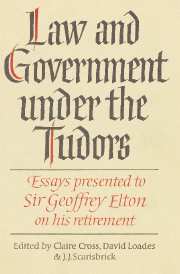Book contents
- Frontmatter
- Contents
- List of contributors
- Preface
- Abbreviations
- Wolsey and the Parliament of 1523
- The Act of Appeals and the English reformation
- Thomas Cromwell and the ‘brethren’
- Henry VIII and the dissolution of the Secular Colleges
- God's law and man's: Stephen Gardiner and the problem of loyalty
- Bondmen under the Tudors
- Wales and England after the Tudor ‘union’: Crown, principality and parliament, 1543–1624
- Robe and sword in the conquest of Ireland
- The principal secretaries in the reign of Edward VI: reflections on their office and archive
- Philip II and the government of England
- Sin and society: the northern high commission and the northern gentry in the reign of Elizabeth I
- The crown, the gentry and London: the enforcement of proclamation, 1596–1640
- Taxation and the political limits of the Tudor state
- Bibliography of the writings of G. R. Elton, 1946–1986
- Index
Thomas Cromwell and the ‘brethren’
Published online by Cambridge University Press: 06 July 2010
- Frontmatter
- Contents
- List of contributors
- Preface
- Abbreviations
- Wolsey and the Parliament of 1523
- The Act of Appeals and the English reformation
- Thomas Cromwell and the ‘brethren’
- Henry VIII and the dissolution of the Secular Colleges
- God's law and man's: Stephen Gardiner and the problem of loyalty
- Bondmen under the Tudors
- Wales and England after the Tudor ‘union’: Crown, principality and parliament, 1543–1624
- Robe and sword in the conquest of Ireland
- The principal secretaries in the reign of Edward VI: reflections on their office and archive
- Philip II and the government of England
- Sin and society: the northern high commission and the northern gentry in the reign of Elizabeth I
- The crown, the gentry and London: the enforcement of proclamation, 1596–1640
- Taxation and the political limits of the Tudor state
- Bibliography of the writings of G. R. Elton, 1946–1986
- Index
Summary
During the ‘progress time’ of the reformation, as he furthered the ‘cause of Christ’, Thomas Cromwell ventured into unknown political territory. The reformers hailed him as God's special ‘instrument’, and promised him that if, ‘for the zeale ye beare unto the trouth’ he ensured that ‘the pure worde of god may ones go forth’, then ‘the whole realme … shall haue … you after in more hye remembrance than the name of Austen that men saye brought the faith fyrst into englonde’. They prayed God ‘to preserve him long to such good purposes, that the living God may be duly known in his spirit and verity’, and besought ‘in our lorde Jesus, you maie liue Nestor in yeres’. Who would not, asked Richard Taverner, extol Cromwell's ‘most circumspect godliness and most godly circumspection in the cause and matter of our Christian religion?’ But most could not believe Cromwell to be circumspect at all, such were the risks he took. He himself knew well enough the mutability of political fortune, especially at the court of a king as restless and insecure as Henry VIII. Like Wolsey, and like his old friend Ralph Sadler, he understood that ‘the fair hests and promises of court are hely water’, sprinkled randomly. Cromwell had faced the wilderness in 1529, when his master Wolsey fell, and in the 1530s the stakes would be higher still.
- Type
- Chapter
- Information
- Law and Government under the TudorsEssays Presented to Sir Geoffrey Elton, pp. 31 - 50Publisher: Cambridge University PressPrint publication year: 1988
- 3
- Cited by

